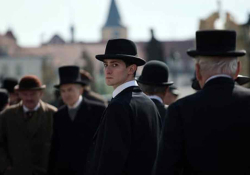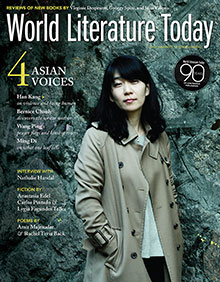The Local as the Global: Reflections on Teaching World Literature

The following essay argues for the importance of shifting world literature courses away from “survey” and toward the interrogation of categories of knowledge that typically organize the world. This is best accomplished by foregrounding minoritized literatures and beginning from “home.”
In recent years I have been searching for strategies to demystify the unruly idea of “world literature” for a general undergraduate student population in a North American university. Although this search relates to specific concerns with college pedagogy, the insights it yields can be useful beyond my particular context. Upon taking up a teaching position in 2010, I was informed by my new colleagues that while I would teach advanced undergraduate courses on world/postcolonial literatures for English majors and graduate courses, I would also teach large numbers of non-English majors seeking to fill the university’s “diversity” requirement. Only recently did I realize that these circumstances and curricular conditions are, in fact, the natural habitat of world literature, where it has the most reach and can do the most work.
Initially, as a newly minted PhD, I was zealously committed to the imperatives of world literature on its own terms and for its own sake. Admittedly, I have not foreclosed on my early goals of producing readers of literary texts who are curious about the different and the distant and, with a little luck, inspiring them to go on to become polyglots and literary scholars. I now see my job, for the most part, as a very different one: less cloistered and more student-oriented in the broadest sense. As a teacher of world literature, I am accountable to all students, and not to English majors exclusively.
The peril of the “great books” approach is that it turns world literature into the instrument of some perfunctory “multiculturalism” that requires little mental labor from students, reducing them to impassive cultural tourists.
Realizing that my world literature course may possibly be the only one of its kind that many students will take, my challenge as a new professor was configuring a one-semester course that maximizes the intellectual rewards of world literature. It is still quite common to encounter the “great books” model, the idea that world literature is an aggregate of what Margaret Cohen calls the “great unread.” The peril of this approach is that it turns world literature into the instrument of some perfunctory “multiculturalism” that requires little mental labor from students, reducing them to impassive cultural tourists. Instead of this approach, world literature courses at the introductory and general level must unsettle students by making them “unthink” their worldviews, or at the very least be conscious of them. World literature must show them the synergies between the local, national, regional, and global.
To this end, world literature courses can, and perhaps must, begin at home, which for my students and myself is Pittsburgh, Pennsylvania, USA. This way, students see how the local, the proximal, and the familiar are coordinates of this thing called the world; the world is not something exotic, menacing, and inhospitable but an accretion of what they consider home, a larger community to which they are native. More specifically, I have found that local literatures produced by minoritized writers are especially conducive to fostering an understanding of the traffic between the local and the global. This is one of the ways in which the conversations around “world” and “postcolonial” literature are finding confluence as categories of inquiry, where world literature takes valuable lessons from the enterprise of postcolonial studies. The latter insists that power and the way one is socially situated affect how one reads and writes the world, an idea that informs the way educators use world literature as a means of encountering and learning from difference.
Foregrounding local and minoritized literatures as an entry into world literature does have a historical antecedent. Johann von Goethe, widely credited with naturalizing the term “world literature” (Weltliteratur), famously declared, “National literature is now a rather unmeaning term; the epoch of world literature is at hand, and everyone must strive to hasten its approach.” Less famous but related to this declaration was Goethe’s attention to local and regional literatures, or “subnational literatures.” I do not mean to ascribe to Goethe some vanguard iconoclasm against the established literary aristocracy, but it is clear that he pondered possible roles that literatures in the crevices and peripheries of the “nation” could play in deprovincializing literature, releasing it from the straitjacket of the national frame of reading. “Ethnic” and “postcolonial” literatures, which only tentatively belong to any national literature, are coming to occupy a special place in the conversations on world literature. They do not necessarily disperse the idea of “national” literatures, but they distress the critical practices around them and demand their rereading. They occasion thinking about literary canons in ways that converge with larger conversations about (un)belonging in lived social communities and how these communities are produced and policed.
•
I realize that beginning a world literature course in the United States, even with minoritized literatures, appears like a retrenchment of American and anglophone exceptionalism, but the alternative is to feign innocence of occasion and the way we are positioned in the world. Literary texts, like pedagogical situations, are “never from nowhere.” Therefore, an intellectually candid and responsible world literature course must acknowledge and grapple with those default positions and ideological latencies that will inevitably shape course structure and intellectual temperament.
The craft and storytelling of Pittsburgh’s greatest literary son, August Wilson, has had an inestimable impact on me. So much so that being in Pittsburgh made sense to me after I read his Pittsburgh Cycle. Though not a native Pittsburgher or a black American, I recognized my own yearnings and anxieties in this work. Wilson’s cycle also centered me as an educator given how organically (but intrepidly) it thrusts itself upon the world. While anchored to a specific place and time, the cycle is culturally agile, navigating and calling attention to the relationships among the local, regional, national, and global. Wilson’s cycle might not appear to be the most germane illustration of the local-as-global. This is because black American literature—unlike other “ethnic” and immigrant literatures, which readily give way to and summon other places and cultures—has primarily been understood as discretely American in its being and deeds. In recent years, however, literary scholarship has reimagined and reconstituted minoritized writings in the United States as voices of the “global south,” a larger conglomeration of communities that resist their silencing in national and linguistic contexts.
The Pittsburgh Cycle is comprised of ten dialogue-driven plays, each of which takes place in one twentieth-century decade as experienced by black Americans. Nine of them are set in Pittsburgh’s Hill District where Wilson grew up, but the cycle also looks toward Chicago, an epicenter of the blues, a genre serving as a comprehensive philosophy of life for Wilson and his characters. In Ma Rainey’s Black Bottom and Seven Guitars, Chicago is even extolled as a place of deliverance for black Americans. The cycle also looks back to the American South, a place of untold and unfinished stories and gaping wounds, the ghosts of which freight Wilson’s characters. Many of Wilson’s characters are immigrants in all but the legal sense. They move from one cultural sphere to another in search of better prospects, even though they do not cross a geopolitical frontier. But like international immigrants, Wilson’s characters harbor a desire for “return.” For Boy Willie in The Piano Lesson, to give one example, the South is the only place where black Americans can be rooted, whole, and sovereign because they have a claim to the land itself.
Africa also looms large in the cycle. Largely imperceptible and irrecoverable, it is an absent presence that is known only through its effects. It makes only furtive appearances, as in The Piano Lesson. Boy Willie and Berniece’s ancestral piano is the play’s extended metaphor, and “its legs [are] carved in the manner of an African sculpture . . . mask-like figures resembling totems.” The Middle Passage haunts the plays that are set in earlier decades like Gem of the Ocean. It is the beginning of the African odyssey in North America, the chapter that sutures the West Africa of bygone centuries to modern Pittsburgh. The Middle Passage also explains Aunt Ester’s (a homologue for “ancestor”) salience. A three-hundred-year-old persona who embodies a history mired in slavery and its aftermaths, she is either present or invoked in almost all the cycle’s plays. Aunt Ester is a healer and sage who intuits other characters’ woes, making those who are world-weary and lost “right with themselves” by transporting them to the “City of Bones” in the middle of the Atlantic Ocean. There she awakens them to the injuries of a history that is felt and lived but not always understood, what Wilson called “blood memory.”
The Pittsburgh Cycle is even conversant with the diffuse yet generative organism known as the African diaspora—a macrocommunity of peoples of African descent living outside of a common reference territory. In Seven Guitars, the putatively mad Hedley channels a larger trans- and international black consciousness that exceeds the experience of being of black in Pittsburgh and the United States. He sees the expanse of the black world as his heritage, a cultural repository from which he freely draws to make sense of his historic conditions. Whether summoning the Queen of Sheba, Marcus Garvey, or Toussaint L’Ouverture, Hedley does so to defy his elementary school teacher’s declaration that he will “amount to nothing [and] grow up to cut the white man’s cane.”
World literature is neither an additive to the canon nor its abolition. It is a critical practice with targeted intellectual outcomes.
The cycle ends with Radio Golf, which is set in the 1990s against the quandaries posed by urban decay and renewal. Harmond Wilkes sacrifices his lucrative real estate career and mayoral aspirations to block the demolition of 1839 Wylie Avenue, Aunt Ester’s long-standing house. He makes this decision in part out of deference to Ester, who moored the black community to the Hill District and who signified “African survivals” for black American culture as it came into its own. Saving Aunt Ester’s house would mean saving the legacy of a person who represented continuity in a history of disruptions and disinheritances.
Readers of Wilson’s plays will notice an unmistakable sense of disquiet in most of the characters, which is caused by spatial and cultural impermanence. One of the reasons Wilson sets his plays in hyperlocal and domestic spaces like kitchens, backyards, living rooms, cafés, and diners is because these spaces are sancta from the uncertainty and tentativeness of their lives as minoritized people who belong everywhere and nowhere, who are and are not American, who are and are not African, simultaneously rooted and itinerant. But they inhabit rings of communities that go out like concentric circles, from their local communities outward toward this thing called the “world.”
•
World literature has its critics, of course. While I refuse to think of world literature defensively or apologetically, I always feel impelled to acknowledge these criticisms in academic forums, many of which invite productive discussions that can only strengthen world literature as an idea and an educational resource. They include the charge that world literature, like area studies, is a form of surveillance and that the reliance of undergraduate world literature curricula on translation sterilizes and domesticates other literatures for American consumption, erasing the very difference that makes them valuable (this view rests on unsound qualitative ideas about translation). Other critics argue that world literature poaches literary texts from elsewhere but grafts a critical apparatus and nomenclature onto them that are alien to the conditions of their own production. Older criticisms of world literature include the observation that it is Eurocentric. While this might have been true, “Eurocentric” is itself a category of diminishing returns because of its own vast omissions. Eastern and central European literatures hardly figured into that “Eurocentricism,” nor, for that matter, did a lot of “western” European literary traditions (Norwegian, Dutch, Belgian, etc.) This is why the euphemism “NATO literatures” came to be. These criticisms may be dour and a little heavy-handed, but they are not patently wrong. Starting with the local is a way of allaying some of these concerns, if for no other reason than the fact that students will be conscious of their cultural bearings and the ways these will inform how they read their way outward, like Wilson’s plays, toward and through the world.
In the past three decades, the world has come to be characterized by prefixes like inter-, poly-, multi-, hetero-, trans-, etc. World literature should be at the forefront of unpacking these prefixes and confronting their social implications. World literature has to marshal the tools and dispensations of literary education for all students, especially those students entering business, the sciences, or law. Those students, no less than we who make our life’s work the reading and weaponizing of literature, will face the pitfalls of not possessing the cultural literacy literature can offer. World literature is neither an additive to the canon nor its abolition. It is a critical practice with targeted intellectual outcomes. It may not change the world, but it has the potential to reshape the way the world appears to a student. Teaching world literature does admittedly come with perils; it courts premature optimism by inviting students to trend toward “we’re all the same after all” based on what they feel to be universals in the texts they read. But this is only a beginning. If students feel that they can at least sense the Other—to “imagine precisely,” in the words of Amitav Ghosh—it can only lead to good things.
Duquesne University












